- Home
- Courtney Milan
What Happened at Midnight
What Happened at Midnight Read online
Table of Contents
Title Page
Chapter One
Chapter Two
Chapter Three
Chapter Four
Chapter Five
Chapter Six
Chapter Seven
Chapter Eight
Chapter Nine
Chapter Ten
Chapter Eleven
Chapter Twelve
Epilogue
Thanks
The Duchess War: Excerpt
Other Books by Courtney Milan
Excerpts from Midnight Scandals Novellas
Copyright
For He Who Must Not Be Named. No, not Voldemort.
Chapter One
February 1856, Southampton, England
“YOU THERE. WHERE DO YOU think you’re off to? And where is your father?”
Miss Mary Chartley came to a stop in the hall, mere steps from escape. The servants’ door was only a few feet away. She silently cursed the board that had let out the telltale creak. Her shoulders ached. Her heart pounded. And behind her eyes, a headache had started, brought on by sleeplessness and unshed—
No. Not tears. She was done with crying.
She gathered her composure and her wits, and turned.
Her father’s one-time business partners had started to ransack the house early that morning. She had heard them come in; the constable who had accompanied them had even questioned her briefly. But they’d busied themselves downstairs, leaving her free to do what needed to be done. She had hoped to simply steal out the back door, with nobody aware of her departure.
“Mr. Lawson.” She gave the nearest man a quick curtsey. “Mr. Frost.” Another dip of her head. Only one of the partners was missing, and she couldn’t let herself think about Mr. John Mason. “Good morning.”
It was absurd to observe the forms of propriety at a time such as this, but she’d been steeped in proper manners for most of her life. Five years of a very expensive finishing school in Vienna had trained her to smile at these men in pleasant harmony even while they pawed through her father’s things.
Mr. Lawson and Mr. Frost had made a shambles of the office. Her father’s carefully sorted papers had been strewn about the room; books had been pulled from their shelves and left in uneven, teetering piles. They’d wrested the drawers from the desk and splintered the wooden boards into kindling.
Lawson raised his head from the wreckage to contemplate her. “Where is your father?” he asked again.
“She doesn’t know anything,” Frost said after giving her a brief, dismissive glance. He was methodically flipping through books, searching for some hidden secret within their pages. “Look at her—dressed for a stroll in the park, as if nothing had changed.”
How else she was to dress, Mary did not know. She had walking dresses and riding habits, dinner gowns and morning gowns. But nothing in her wardrobe was marked, “Wear me in the event of disaster.” Her hand clenched inside its glove.
Frost tossed the book he held to one side and picked up another. But Mr. Lawson was still looking at her. Staring, really, in a manner that was anything but polite.
Ignore it, and your better manners will soon embarrass him into behaving properly. That was what the etiquette instructor at her finishing school would have advised her.
Ha. The instructor hadn’t known Mr. Lawson. He set down his papers and stepped toward her.
Her heart pounded faster. His lips were compressed in anger, but his eyes… She didn’t like that unblinking reptilian look in his eyes, nor the slither in his step.
“Where is your father, Mary?”
“Miss Chartley,” she corrected gently. “I think we’ll all be happier if you call me Miss Chartley, and—”
He grabbed her wrist. “You really don’t understand. You stupid creature. ‘Miss Chartley’ is what I’d call a lady, and in case you haven’t discovered it, you no longer fit the description. The sooner you recognize that, the better it will go for you.”
Mary yanked her wrist away. She hadn’t had time for soul-searching. She certainly hadn’t had time to quietly contemplate her new position in the complicated taxonomy of womanhood. All her thoughts since three that morning had been consumed by one thing: getting her trunk and its contents miles away from these men before they discovered the truth.
“No railway receipt, no record of a hired cab,” Frost was saying, shaking his head. “It’s as if Chartley simply vanished. And when I find him—”
No question about it. Mary had to get her trunk away from here, and quickly.
But Lawson took hold of her wrist once more, wrenching her arm around her back as if she were a scullery maid caught stealing the silver. “Where is your bleeding father?”
That twisting motion really hurt, sending stars floating across her vision. Aside from the rap of a ruler across her knuckles, nobody had ever touched her in violence.
But it wasn’t the pinched face of her etiquette instructor that came to mind. It was the round, frowning visage of her piano master.
Weep later, he would have said in a heavy German accent. Play now.
She jutted out her chin. “I don’t know.” True in at least one respect. She wanted to believe that Papa, whom she’d loved so dearly, was in heaven. But if there was any truth to what the curate said, he was likely in hell.
“And what message did he leave you?” His grip tightened on her wrist.
“Nothing.” Lying came easier, the more she did it. Her father might have been a cheat and a thief, but he’d loved her and she’d loved him. She would save him this final indignity.
“You’re getting tiresome, Mary.” Lawson yanked her wrist. She took two stumbling steps toward him before she found her balance. “I don’t think you understand what it means that he’s abandoned you. If he’s gone for good, you’re nothing.”
Her skin crawled, but she suppressed all hint of a shiver. “I still don’t know—”
He wrenched her elbow. “You really don’t understand. Why, as your father’s closest associate, I’m practically your guardian. And do you know what I do with wayward girls who won’t speak to me?”
There was nothing he could do to her anymore. She’d been the one to discover her father’s note. She’d found his body. The physical pain was nothing to that. But every second she remained here being manhandled by them was another moment where someone might find the trunk she’d lowered out her window.
Her father was an embezzler and a suicide. Nobody would help her—nobody except herself. She shut her mouth and tried once again to free her arm.
Lawson pulled his arm back, made a fist—
“Lawson,” a new voice said, “what do you think you’re doing?”
Lawson straightened, moving away from Mary so quickly that she gasped in relief.
“Aw,” Lawson said, “I didn’t mean any harm. I was just going to—”
“I have a good idea what you were going to do.” With those words, John Mason stepped into her father’s office. Mary shut her eyes. She hadn’t cried, not even when she’d realized that her father had left her alone with nothing. Not when she’d realized that the future she’d dreamed of was gone forever. It had been easy to bury her fear, her despair, her mourning. Those emotions were too big to believe, her loss too large to comprehend.
Why, then, did the sight of John Mason make her want to weep?
She opened her eyes wide, willing that stupid moisture to evaporate into nothingness.
Across the room, John met her gaze briefly and then looked away.
He didn’t belong with these men; he never had. The other men were both grandfathers; John was scarcely twenty-five. They were dressed in sober, respectable browns and grays, every whi
te starched to points; John’s cravat was a bare pretense of a neckcloth, well-laundered but soft. Most of all, the other men were thin and pale from hunching over desks, while John’s hours out of doors had left him golden skinned and broad shouldered.
He hadn’t been part of their initial investment scheme. His father and his brother-in-law had been involved. But he’d taken over when his relatives had passed away.
That was how she had met him.
She had always believed his eyes were sweet—large and liquid brown. There had been nothing sweet about them last night when he’d confronted her father, proof in hand, finger pointing directly at his chest. There was nothing sweet about them now, either. Mary’s stomach churned, and she looked away.
“Don’t be difficult, boy,” Lawson said. “It’s your money at stake, too. She knows something. I swear it’s so.”
“I don’t truck with hitting ladies,” John responded.
“She’s no lady.”
John’s eyes flicked to Mary, touching her without really seeing her. But he didn’t contradict the older man. He simply shrugged. “I don’t truck with hitting women, either,” he said in a low growl, then spat on the ground.
Don’t spit on Papa’s carpet, some stupid part of her wanted to say. As if the Turkey carpet mattered. Just one more possession to be sold to make up for his wrongdoings. One more thing for her to leave behind. Still, that disrespect hurt more than John’s casual acceptance of her new status.
“Come now,” Lawson said. “Given what her father owes us, she’s practically a servant. It’s not wrong to slap—”
John shoved the other man into the wall of the office. “I mean it, Lawson. That’s enough.”
She forced herself to concentrate on the hard lines of John’s face, so different from the confident smile that he usually gave her when their paths crossed. He made her think of a rocky cliff: impossibly hard, with an unforgiving drop to the crags below.
“Very well,” Lawson finally muttered with a sullen sneer. “But one day, you’ll regret letting her go. Useless bitch.” That last was directed at her.
Mary wouldn’t give him the satisfaction of seeing her affected by that epithet. She simply nodded to the two men, as if this were the last round of an exchange of pleasantries, and turned to go.
John set his hand in the curve of her spine and guided her away, down the dark hallway, to the back of the house. He wrenched the servants’ door open and then glanced outside, verifying that nobody was about. Then, and only then, did he turn to her.
“Mary…” He ran one hand through the dark brown of his hair. She’d never heard his voice like this—dark and rumbling like thunder on the horizon. She’d never seen his eyes like this, either. There was a tension in them, worry lines gathering at the corners. He wasn’t quiet because he intended to be gentle with her. It was the quiet of a pot on the verge of boiling over.
“John.” She shut her eyes.
“Swear to me that you don’t know where he is.”
Like everyone else, he was thinking only of her father. But unlike the others, at least he believed her. For now. Mary’s thoughts went to her trunk, to the ache in her arms.
“If I had to guess,” she told him gravely, “I would say that he went straight to hell. He left me—” All that angry fury raged within her for a moment, startling in its heat. No place to put it now; she had too much to do.
“Did he tell you where the money was?”
“Not a word.”
“What are your plans? Is that your trunk over there?” His tone was curiously flat as he spoke to her—not devoid of emotion, but withdrawn, as if he’d turned away from his own feelings.
She hadn’t dared to look at the massive steamer trunk where it lay. It had followed her from Southampton to Vienna, and then back for more holidays than she could count. It was large enough to fit all the many components of a lady’s wardrobe, and that made it very large indeed. The rope she’d used to lower it was still fastened to one handle, the brass fittings dented where it had banged against the ground when it had gotten away from her. She glanced over, bit her lip, and nodded.
He didn’t rush over and open it. Thank God.
“Do you have anywhere to go?”
“My father’s second cousin lives in Basingstoke. He’ll take me in.” The lies came easier now.
“And you have a plan.” He nodded. “I wish…” His voice was still flat, but his lips pressed together.
She turned away. “Don’t wish. You’ll only say something that we’ll both regret. After last night, anything more is impossible.”
And yet the possibility of that more kept intruding on her. Was it so little, then, that they’d had between them? She had liked the look of him, the way that he laughed. He’d liked the look of her. That was all. A few months’ acquaintance.
A few kisses, a few conversations—not much, but enough to spark a lifetime of hope. Enough that she’d chosen the possibility of him and family over…
No. She couldn’t let herself think that way any longer. Those memories belonged to another woman entirely—Miss Mary Chartley, the daughter of a respected member of the community. She wasn’t sure who she was in this skin any longer, but she’d ceased to be that person. No matter what she and John might once have been to one another, it wasn’t enough to survive the cataclysm of discovering that her father had taken thousands of pounds from their partnership.
She took off one glove, removed the ring from her finger, and held it out to him.
His flat façade finally cracked. His hand slapped against his trousers, and he turned his head from her. “God damn it.”
“Set it against my father’s debt.”
His jaw worked. It took him a few breaths to regain his composure, but when he turned back, he didn’t take the ring from her. “You’ll need help getting to the station.” Before she knew what was happening, he was reaching for the handle of her trunk.
She couldn’t let him touch that. If he tried to lift it, he might wonder what made her luggage so heavy.
“Really, John,” she said sharply, stepping in front of him. “I should think you’ve done enough.”
“It doesn’t have to be this way.”
“Doesn’t it? Say you love me, that you would marry me without any fortune, with my father in disgrace. Say your sister would welcome me into the family, knowing that my father stole her son’s future.”
He met her eyes. She wasn’t sure what she saw reflected there. Regret? Anger? “You’re right,” he finally said. “I can’t say anything of the sort. But—”
“I don’t love you, either. If I did…” She slipped the ring into his hand. “If I did, surely I could not give you this with my head held high.”
If he’d put her in mind of thunder before, that flashing look in his eyes was the lightning, spearing her through in one instant. For one second, she thought he was actually going to grab hold of her. But he didn’t move. He didn’t even frown. He simply took a deep breath and shoved the ring into his pocket.
“Well, then.” Another breath, and he looked away. “Good riddance.” His voice dropped low on that last.
It was a good thing her heart had turned to stone, or it might be breaking now. She hadn’t loved him. She couldn’t have. If she’d loved him, she would be weeping now, and she refused to weep. But they would have had a home all of their own. Children. Happiness. Warmth. She would have had John himself, so sweet, so strong, and yet so utterly implacable when betrayed…
She nodded.
He leaned down to her. He didn’t put his hands on her and draw her close, as he might once have done. Still, she felt the echo of those prior intimacies on her skin. On her lips, tingling with his nearness.
He was going to kiss her one last time. She’d yearned for his kisses before, but she didn’t want one now. She wanted her memories of him to remain unsullied by the last twenty-four hours.
But close as he came, his lips didn’t touch hers.
; “Mary,” he said softly. “My nephew’s future depends on the income from this partnership. If I find out that you have lied to me, that you know where your father is and where he hid what he stole…” He raised his eyes to hers. “I will escort you to the gates of hell myself.”
Chapter Two
Eighteen months later, Somerset, on the edge of the hills of Exmoor
THE AUGUST SUN BEAT DOWN like the breath of hell itself. Fitting, John Mason decided, for the task that lay ahead.
Not, of course, the work that he was supervising now—that was dead easy, watching the digging in four fields so that he might lay drains that had long since ceased to function. No, it was his other, private task that had left him feeling like one of the damned.
Another man would have been happy to see Beauregard approach on horseback. He would have welcomed the respite from the midmorning sun and the labor.
His host—John supposed that was the proper appellation for the man—had a mare saddled, following behind him.
“Mason,” Beauregard said, raising a hand in greeting. “I can’t believe you’ve started work already, and on the first morning, too.”
John glanced at the sun—already a good measure above the horizon—and shook his head. “No point in dawdling. I’ve been in your fields these last five hours. By the time the clock strikes ten, I scarcely consider it morning any longer.”
“That’s why I have an estate manager.” Beauregard grinned. “And friends.” He smacked John on the shoulder.
Friends was stretching the truth. Acquaintances, perhaps—and unlikely ones at that. John had dashed off a piece about his experiences with drainage techniques for a farmer’s gazette. Beauregard had read it and written to him, asking for help and clarification. Two months of correspondence later and John had been ready to write the man off as hopeless. That was when a chance mention in a letter had caught his attention.
“I did promise to introduce you to the neighbors,” Beauregard said. “I don’t expect you to work all day. You’re my guest, not a laborer.”
John didn’t bother correcting the man. Yes, John owned land in Southampton. But he had no illusions about what that meant. There was a lot less gentleman in him than there was farmer. He wore a thousand hats—veterinarian to his cattle, chemist when it came to soil treatment, mechanic to the plows. Right now, he was posing as Beauregard’s personal drainage engineer. He’d inherited a rather soggy piece of land himself, and had developed something of a talent for walking a piece of ground and understanding the underground streams, the seep of water just below the surface, the strange accidents of soil and slope that explained why one field was a swamp and the other a lush meadow.

 Her Every Wish
Her Every Wish Midnight Scandals
Midnight Scandals After the Wedding
After the Wedding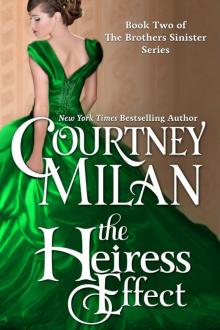 The Heiress Effect
The Heiress Effect Unraveled
Unraveled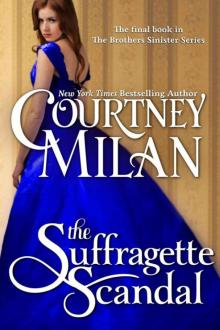 The Suffragette Scandal
The Suffragette Scandal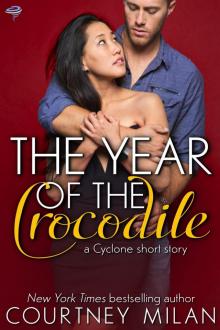 The Year of the Crocodile
The Year of the Crocodile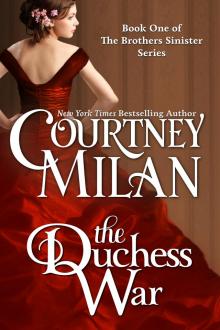 The Duchess War
The Duchess War What Happened at Midnight
What Happened at Midnight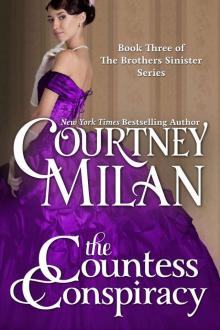 The Countess Conspiracy
The Countess Conspiracy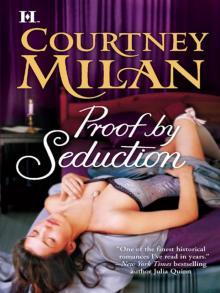 Proof by Seduction
Proof by Seduction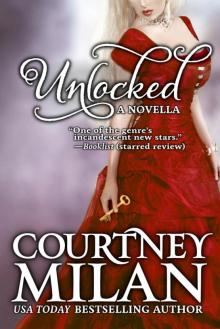 Unlocked
Unlocked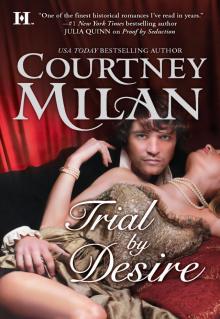 Trial by Desire
Trial by Desire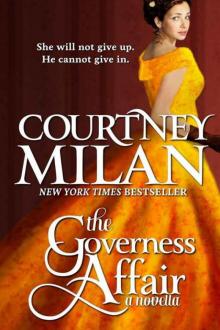 The Governess Affair
The Governess Affair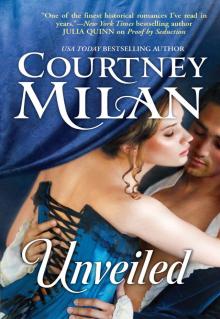 Unveiled
Unveiled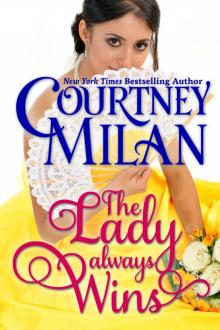 The Lady Always Wins
The Lady Always Wins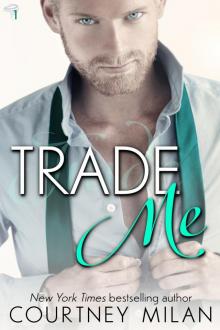 Trade Me
Trade Me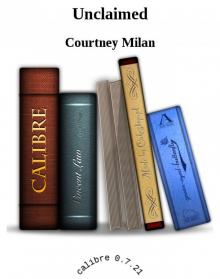 Unclaimed
Unclaimed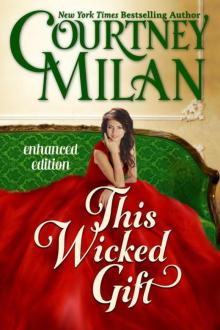 This Wicked Gift
This Wicked Gift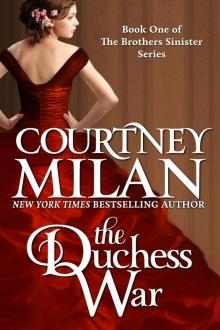 The Duchess War (The Brothers Sinister)
The Duchess War (The Brothers Sinister)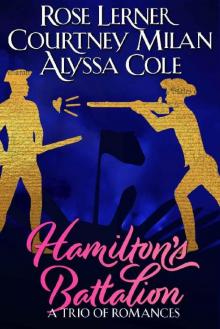 Hamilton's Battalion: A Trio of Romances
Hamilton's Battalion: A Trio of Romances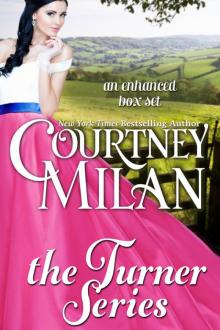 The Turner Series
The Turner Series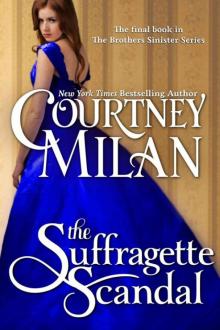 The Suffragette Scandal (The Brothers Sinister)
The Suffragette Scandal (The Brothers Sinister)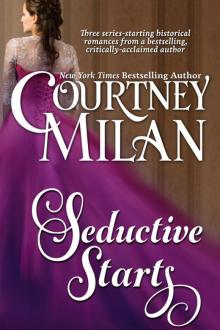 Seductive Starts
Seductive Starts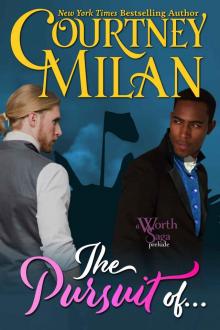 The Pursuit Of…
The Pursuit Of…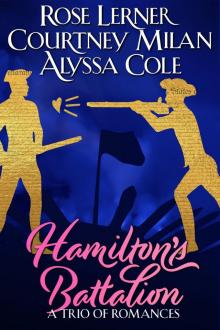 Hamilton's Battalion
Hamilton's Battalion The Carhart Series
The Carhart Series Seven Wicked Nights
Seven Wicked Nights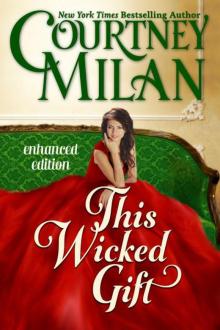 This Wicked Gift (A Carhart Series Novella)
This Wicked Gift (A Carhart Series Novella)